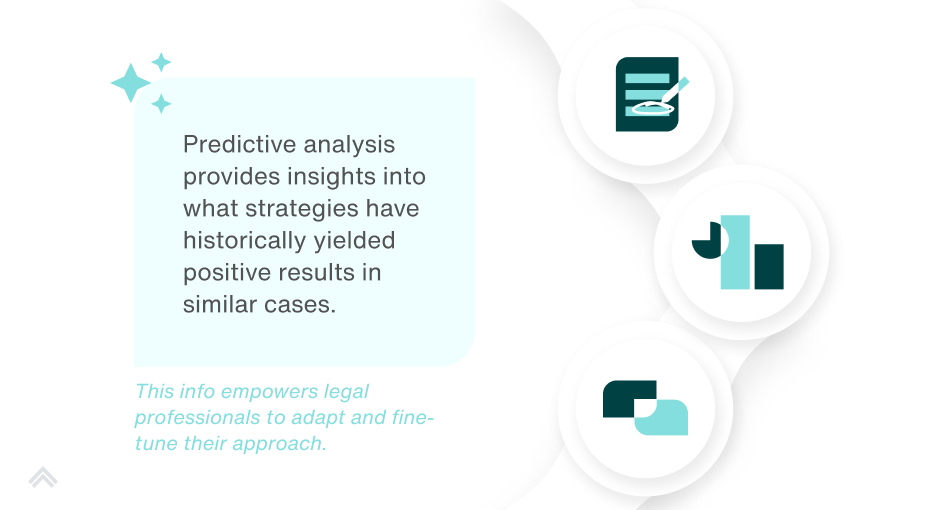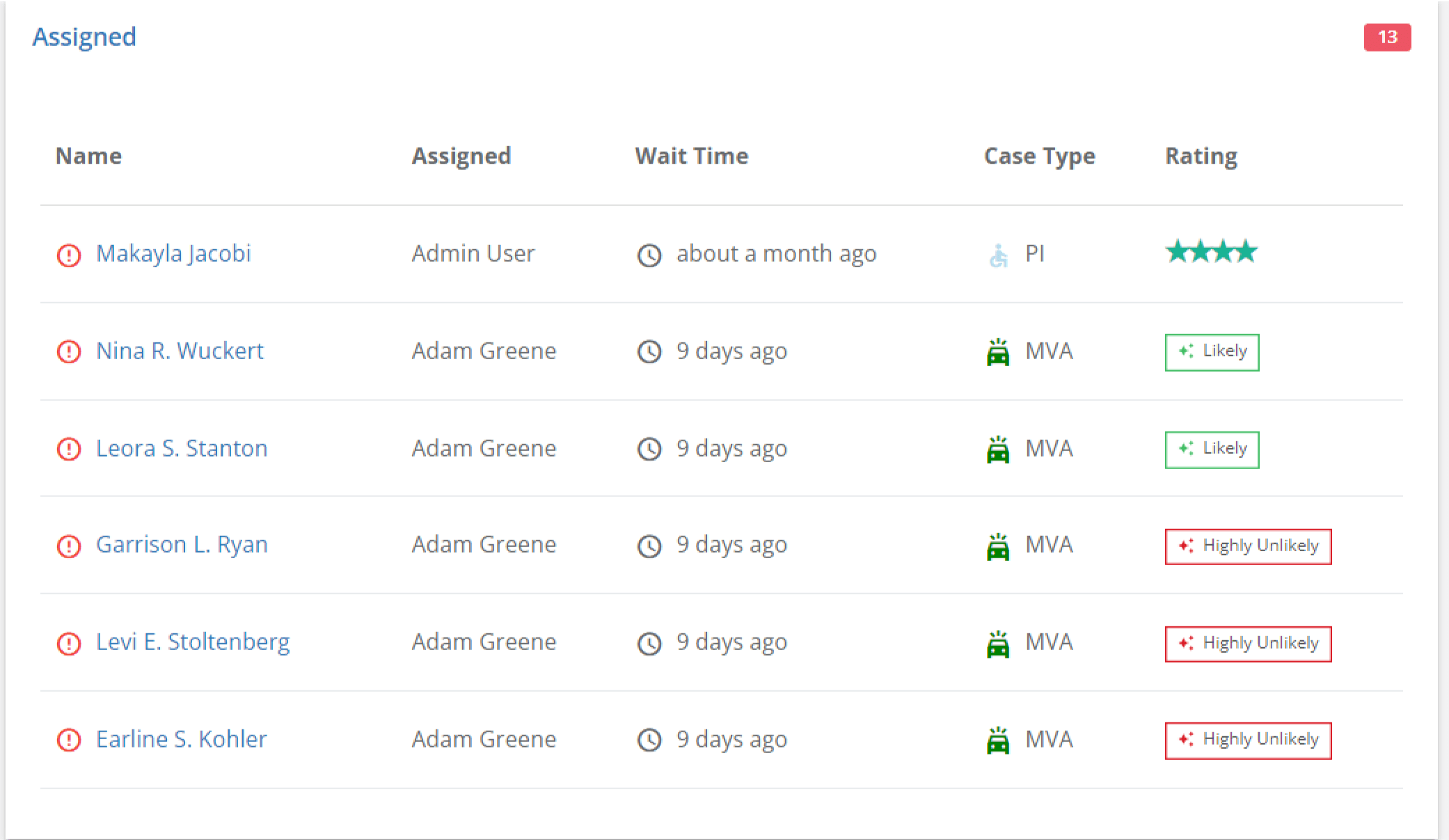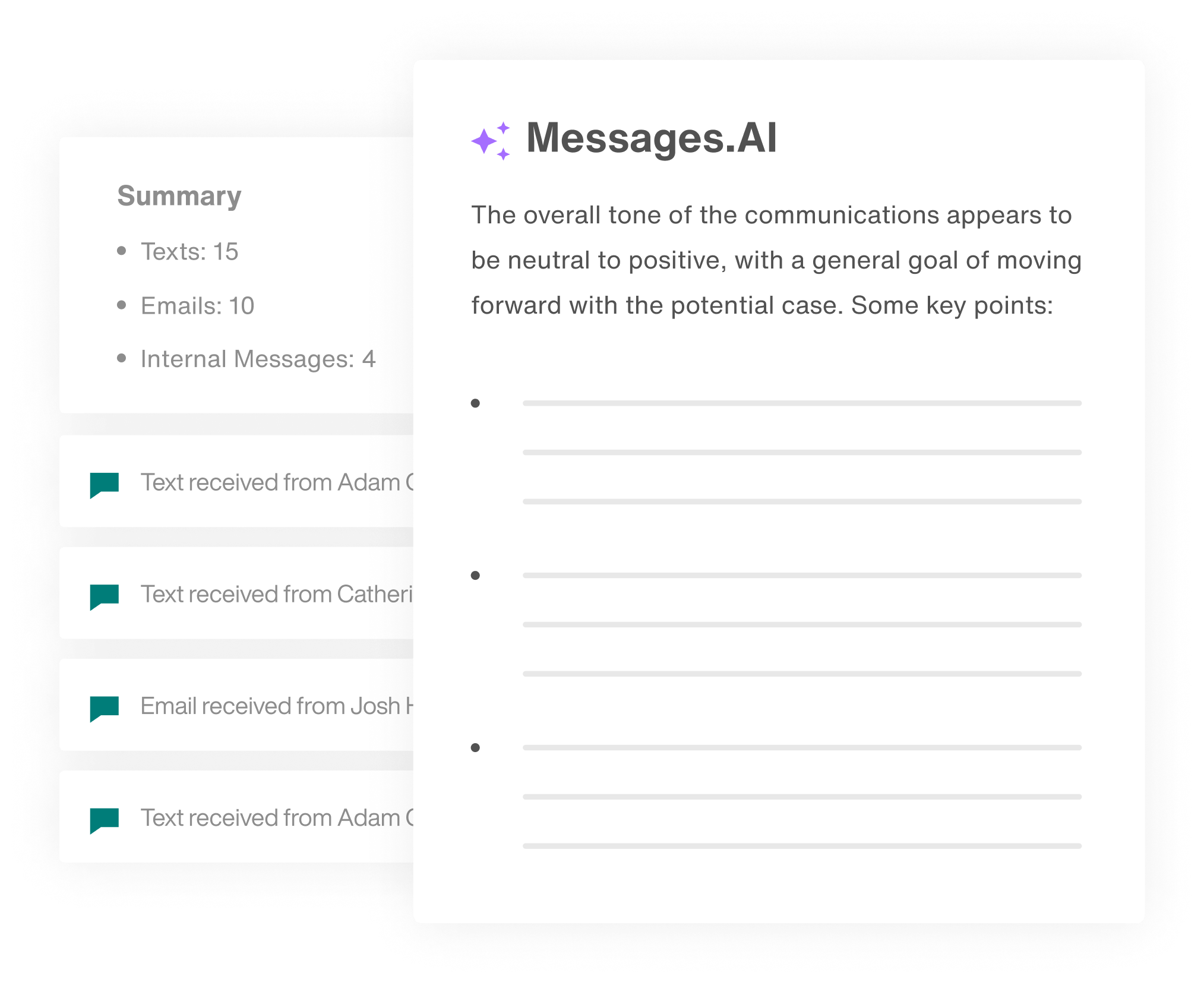In the ever-evolving landscape of the legal profession, staying ahead of the curve is no longer a luxury — it's a necessity. As legal professionals, we recognize the vital role that intake management plays in our daily practice. It's the gateway to sound decision-making, enabling us to filter potential cases, manage client relations, and allocate resources effectively. The traditional methods of intake management, while valuable, are increasingly being supplemented and enhanced by advanced tools and technologies.
This article delves into the cutting-edge world of legal predictive analysis and its transformative impact it will take on intake management. We'll explore the significance of lead management tools and solutions that are propelling the legal industry into a future where data-driven insights lead to more informed choices.
Legal Predictive Analysis Explained

Defining the Landscape of Legal Predictive Analysis
In a world dominated by data and technology, legal professionals are increasingly turning to predictive analysis as a powerful ally in their quest for more efficient intake management. But what is legal predictive analysis, and why is it creating such a buzz?
At its core, legal predictive analysis or AI Predictions is a sophisticated data-driven technique that leverages historical case data, case law, and a host of other legal data points to forecast future legal outcomes.
In simpler terms, it's a way of using the past to predict the future in a legal context. By employing machine learning algorithms and artificial intelligence, legal professionals can analyze vast volumes of legal data to discern patterns, trends, and insights that may have remained hidden through conventional methods.
Unraveling the Mechanics: How Legal Predictive Analysis Works
Legal predictions operate by systematically sifting through mountains of legal data. This includes court records, case details, statutes, and judicial decisions. The technology applies a series of sophisticated algorithms to identify correlations and trends within this sea of information.
The goal is to determine how certain legal factors, actions, or precedents impact the outcome of cases. These algorithms learn from past cases and, in turn, become increasingly adept at making predictions over time. It's a form of legal fortunetelling, driven not by crystal balls but by algorithms refined through ongoing learning.
Applications in the Legal Field: Unveiling the Potential
The applications of legal predictive analysis are as diverse as the field itself. Here's a glimpse of how it's revolutionizing the way legal professionals approach their work:
- Case Success Analysis: AI Predictions helps attorneys predict the potential success of a case. It evaluates factors such as the type of case, judge, jurisdiction, and even the opposing counsel's history to forecast the likelihood of success.
- Identifying Correlations: The technology excels at identifying correlations between seemingly unrelated legal factors. This can unveil insights into why certain cases succeed while others fail.
- Litigation Strategy: By providing data-backed insights into case outcomes, predictive analysis empowers legal professionals to formulate more strategic litigation plans. It helps in deciding which cases to pursue and which to settle.
- Cost Savings from Automating Human Work: Predictive analysis can automate tasks that once required significant human input, significantly reducing legal operational costs.
- Case Precedent and Scoring: It offers comprehensive insights into case precedent, helping attorneys understand how similar cases have fared in the past. This information can guide legal strategies.
- Case Quality Score: By assessing the quality of a case, predictive analysis ensures that legal teams are focusing their resources on cases with higher potential for success.
A Catalyst for Improved Intake Management
One of the most intriguing aspects of legal predictive analysis is its impact on intake management. As legal professionals sift through a constant influx of potential cases, the ability to discern which cases are most likely to succeed is invaluable. It streamlines the intake process by enabling better decision-making from the outset.
Types of Predictive Analysis

Sentiment Analysis: Uncovering the Emotional Context
Predictive analysis isn't just about crunching numbers and predicting outcomes; it can also decipher the emotional undertones of legal cases. Sentiment analysis is the process of assessing the emotions, opinions, and attitudes embedded within legal documents, social media posts, emails, or any text data related to a case.
In the context of intake management, sentiment analysis is a powerful tool. It can help legal professionals gauge the emotional context of a case, such as the anger, frustration, or fear conveyed by the client. Understanding the emotional nuances allows attorneys to tailor their approach to the client's needs and create a more empathetic attorney-client relationship.
Some of the companies that are leading the study and implementation of Sentiment analysis are Idiomatic and Monkeylearn.
MonkeyLearn offers a comprehensive suite of text analysis solutions, excelling in areas such as NPS analysis, review analysis, and more. With their instant data visualizations and detailed insights, MonkeyLearn empowers legal professionals to glean nuanced sentiment from customer feedback, paving the way for a finely tuned customer profile.
On the other front, Idiomatic takes customer feedback translation to the next level. By translating customer sentiments into actionable data, Idiomatic provides a roadmap for businesses, ensuring that every decision, from product development to marketing strategy, is informed by a deep understanding of the customer experience.
Voice Analysis: Beyond Words
Voice analysis is another facet of AI Predictions that's revolutionizing intake management. It involves analyzing not just what is said but how it's said. This technique uses advanced algorithms to detect emotions, stress levels, or other vocal cues in the client's voice.
In the legal intake process, voice analysis can help attorneys gain insights into the client's emotional state, even before they've provided substantial information about their case. For instance, by detecting stress or anxiety in the client's voice, attorneys can offer more immediate assistance or support.
Tethr and Dialpad, stand out for their pioneering work in Voice analysis. Tethr specializes in conversation analytics, harnessing the power of AI to extract valuable insights from voice interactions. By scrutinizing not just the content but also the emotional nuances conveyed through tone and cadence, Tethr enables legal professionals to delve deeper into client communications.
On the other hand, Dialpad, with its cloud-based communication platform, contributes to the evolution of voice analysis. Leveraging innovative technologies, Dialpad provides a comprehensive solution for organizations seeking to enhance their voice communication processes. These platforms open up new possibilities for law firms, allowing them to interpret not only what clients say but also how they express themselves.
Case Success Analysis: Predicting Outcomes
One of the most potent applications of AI Predictions is in forecasting the success of a legal case. Case success analysis, driven by machine learning algorithms, examines a wide array of data points from past cases to assess the probability of a positive outcome for a given case.
In the intake process, this means that attorneys can make more informed decisions from the very beginning. By feeding case details into the predictive analysis system, they can receive valuable insights about the case's potential and the likelihood of success. This can guide attorneys in deciding whether to take the case, explore settlement options, or proceed with litigation.
In tandem with this revolutionary approach, LeadsAI introduces its Predictive Analysis model, a groundbreaking feature designed to refine and enhance the case success analysis. Trained in-house on faceless data points, this model looks for answers to qualifying questions and overall resolution of the outcome. With access to hundreds of thousands of Motor Vehicle Accident, motorcycle, and trucking leads, totaling over 10 million data points, LeadsAI empowers your intake team with the confidence to make the right decisions.
This powerful combination of case success analysis and LeadsAI's Predictive Analysis ensures that attorneys have a comprehensive toolkit to navigate the complexities of legal cases, with a focus on optimizing outcomes and client satisfaction.
The Relevance in Legal Intake
Integrating these types of predictive analysis into the legal intake process significantly enhances the ability to assess potential cases. Imagine a scenario where a potential client contacts your law firm, and within a few minutes, your systems have analyzed the sentiment in their communication and the emotional cues in their voice, while also evaluating the case's likelihood of success. The result? A more empathetic, efficient, and data-driven intake process.
Predictive Analysis in Litigation Strategy

Identifying Correlations and Patterns
Predictive analysis isn't confined to just making initial case assessments; it's also a potent tool for identifying correlations and patterns within the legal field. By examining large volumes of legal data, these algorithms can detect trends, relationships between variables, and previous outcomes in similar cases.
In the realm of litigation, this capability opens a world of possibilities. For instance, attorneys can employ predictive analysis to assess which legal strategies were most effective in cases with circumstances similar to their current one. This data-driven approach allows for the crafting of more strategic, well-informed litigation plans, increasing the chances of a successful outcome.
Shaping Litigation Strategies
AI Predictions will play a pivotal role in the formulation of litigation strategies. By providing insights into what strategies have historically yielded positive results in similar cases, it empowers legal professionals to adapt and fine-tune their approach.
The analysis might reveal that certain case aspects, such as particular types of evidence or expert witnesses, tend to favor the plaintiff or defendant. This knowledge allows attorneys to prioritize the most effective elements in their strategy, improving their odds of success while conserving resources.
Case Scoring and Quality Analysis

Understanding Case Quality Score
At the heart of this process is the concept of a "case quality score." This score is a numerical representation of the quality, viability, and potential success of a legal case. It is derived from a thorough analysis of various case-specific factors, such as:
- Case details and circumstances
- Historical case outcomes
- Relevant case law
- Case precedents
- Court and jurisdiction specifics
- Legal strategy effectiveness
- Resource requirements
By weighing and evaluating these factors, predictive analysis generates a case quality score that can guide legal professionals in making more informed decisions. A higher score typically indicates a case with a greater potential for success, while a lower score may highlight areas of concern that need attention.
Enhancing Case Evaluation
The use of predictive analytics in case quality assessment enhances the evaluation process. Legal professionals can rapidly review a case, including its background, circumstances, and supporting evidence, and input these details into the predictive analysis system.
The system then generates a case quality score, allowing lawyers to make quicker, data-informed judgments regarding the viability of a case. For example, a lower case quality score might prompt more in-depth research, additional evidence gathering, or alternative legal strategies to bolster the case's chances of success.
By simplifying the initial assessment process, predictive analysis aids legal professionals in focusing their efforts where they matter most, optimizing resource allocation, and ultimately improving the quality of legal services.
The Future of Intake Management
The legal industry is undergoing a significant transformation, largely fueled by the integration of predictive analysis. This technology is set to revolutionize intake management, offering numerous benefits that legal professionals simply can't ignore.

The Potential of Predictive Analysis
Predictive analysis, in particular, has the power to reshape the legal landscape. Its advanced algorithms, data analytics, and machine learning capabilities can predict case outcomes, streamline processes, and unlock invaluable insights.
1. Streamlined Case Selection: Law firms can more effectively select cases with higher potential for success, minimizing wasted resources on unwinnable cases.
2. Increased Efficiency: AI PRedictions automate routine tasks such as document review and legal research, saving both time and money.
3. Enhanced Quality: By assisting legal professionals in building stronger arguments and legal strategies, predictive analysis improves the overall quality of legal work.
4. Cost Savings: Automation and improved efficiency contribute to substantial cost savings in the long run.
5. Accessible Legal Services: AI Predictions enables law firms to offer more competitive pricing, making legal services more accessible to clients.
Embracing the Future
To remain competitive and provide the best possible service, legal professionals should be prepared to embrace predictive analysis tools. Here are key considerations:
Adoption of Legal Tech: Once predictive analysis becomes solidified in the tech space, be ready to incorporate legal tech solutions that integrate predictive analysis into your practice. Many of these tools are user-friendly and designed to enhance, not replace, the work of legal professionals.
Continuous Learning: Invest in training and education to ensure that your legal team is proficient in using AI Prediction tools. This is crucial for maximizing the benefits they offer.
Data Management: Pay careful attention to the data you use for predictive analysis. Ensure that it is relevant, accurate, and unbiased, as the quality of results depends on the quality of input data.
Harnessing the Power of Predictive Analysis in Legal Intake Management
In the fast-evolving landscape of the legal industry, staying ahead of the curve is crucial for legal professionals. The integration of predictive analysis in legal intake management is a transformational step, offering a myriad of benefits and reshaping the way legal professionals operate.
It's Time to Transform
The legal industry is evolving rapidly, and AI predictions are at forefront of this transformation. By adopting these tools and technologies, legal professionals can unlock the power of data-driven decision-making and navigate the complex legal landscape with greater confidence and efficiency.
As you move forward, consider how you can leverage predictive analysis to streamline your processes, enhance your services, and ultimately, deliver the best possible outcomes for your clients. The future of legal intake management has arrived, and it's filled with new opportunities.
LeadsAI
Ready to experience the future of legal intake and case success analysis firsthand? Unlock the potential of LeadsAI's Predictive Analysis with a free demo.
Witness how this cutting-edge tool, powered by machine learning and an extensive database of case data, can revolutionize your firm's decision-making process. Don't miss out on the opportunity to elevate your legal practice.
Click here to schedule your free demo and embark on a journey toward more informed, confident, and successful legal outcomes.